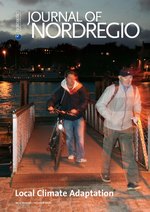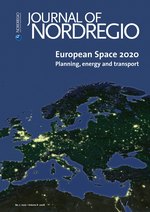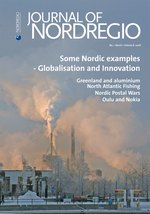Journal of Nordregio no 4, 2008
Local Climate Adaption
 Bundled with this issue of the Journal of Nordregio you should also receive the publication, Climate Change Emergencies and European Municipalities—Guidelines for Adaptation and Response. Click at image to the right. Our hope is that this will be both useful and inspirational for those developing further work on climate adaptation. Most of the presentations herein are results of the Nordregio project Municipal Responses to Climate Change Emergencies (MuniRes). This is an international project with partners and associates from Denmark, Germany, Finland, Italy, Lithuania and Sweden.
Bundled with this issue of the Journal of Nordregio you should also receive the publication, Climate Change Emergencies and European Municipalities—Guidelines for Adaptation and Response. Click at image to the right. Our hope is that this will be both useful and inspirational for those developing further work on climate adaptation. Most of the presentations herein are results of the Nordregio project Municipal Responses to Climate Change Emergencies (MuniRes). This is an international project with partners and associates from Denmark, Germany, Finland, Italy, Lithuania and Sweden.
Journal of Nordregio no 4, 2008
Journal of Nordregio no 3, 2008
Arctic ahead!
EU, Greenland and Finnmark
 For people living in sparsely populated areas like Hammerfest future job security is of the utmost importance. However, perhaps more than anything else here, the lesson of history is that there are no guarantees even if the resources are more or less just outside your door. Much of the production of oil and gas in the North Sea is offshore, and with further technological developments this can also become the case for the High North.
For people living in sparsely populated areas like Hammerfest future job security is of the utmost importance. However, perhaps more than anything else here, the lesson of history is that there are no guarantees even if the resources are more or less just outside your door. Much of the production of oil and gas in the North Sea is offshore, and with further technological developments this can also become the case for the High North.
Journal of Nordregio no 3, 2008
Journal of Nordregio no 2, 2008
European Space 2020
Planning, energy and transport
 A key element in this issue of Journal of Nordregio is the discussion over the future of the European space, which definitively includes the megapoles of this continent. In the lead article Professor Klaus Kunzmann agues that the periphery is not only the area far or further away from the cities. In fact, the periphery can be the poor suburbs, the banlieues, as they are called in France, just outside the city centres.
A key element in this issue of Journal of Nordregio is the discussion over the future of the European space, which definitively includes the megapoles of this continent. In the lead article Professor Klaus Kunzmann agues that the periphery is not only the area far or further away from the cities. In fact, the periphery can be the poor suburbs, the banlieues, as they are called in France, just outside the city centres.
Journal of Nordregio no 2, 2008
Journal of Nordregio no 1, 2008
Some Nordic examples
- Globalisation and Innovation
 Many would argue that the world at present is riding high on a wave of globalisation. Many would also argue that like all good things, there is an end to this, or maybe not? Could it simply be that with so many inhabitants, with transport relatively accessible and cheap and with political liberalism seemingly triumphant that globalisation is here to stay? In other words, that globalisation is a constant process proceeding at different speeds.
Many would argue that the world at present is riding high on a wave of globalisation. Many would also argue that like all good things, there is an end to this, or maybe not? Could it simply be that with so many inhabitants, with transport relatively accessible and cheap and with political liberalism seemingly triumphant that globalisation is here to stay? In other words, that globalisation is a constant process proceeding at different speeds.
Journal of Nordregio no 1, 2008